#as long as there are humans there will be linguistic variation
Text
i made the spanish joke in the tags but i am quite firmly Not engaging with the doctor's line that all humans speak that same language at whatever future point they travel to, given how much that violates human nature and social development and everything that makes us people 🙂↔️ I do not see it
#as long as there are humans there will be linguistic variation#we quite literally cannot help ourselves#this is sociolinguistics day one rules#holding out for the possibility that they are in a totalitarian environment a la big brother otherwise it's simply not possible#personal post#dw#linguistics#join me in overanalyzing the language on the MAVITY show. i have better things i could be doing with my time#doctor who
2 notes
·
View notes
Photo

Philology
Philology is derived from the Greek terms φίλος (love) and λόγος (word, reason) and literally means a love of words. It is the study of language in literary sources and is a combination of literary studies, history and linguistics. Philology is generally associated with Greek and Classical Latin, in which it is termed philologia. The study of philology originated in European Renaissance Humanism in regards to Classical Philology but this has since been combined to include in its definition the study of both European and non-European languages. The idea of philology has been carried through the Greek and Latin literature into the English language around the sixteenth century through the French term philologie meaning a 'love of literature'
Generally philology has a focus on historical development. It helps establish the authenticity of literary texts and their original form and with this the determination of their meaning. It is a branch of knowledge that deals with the structure, historical development and relationships of a language or languages.
The Branches of Philological Studies
Comparative philology is a branch of philology which analyses the relationship between languages. For instance, the commonalities between Latin and Etruscan or further flung languages of Asian or African provinces.
Cognitive philology studies written and oral texts in consideration of the human mental processes. It uses science to compare the results of research using psychological and artificial systems.
Decipherment is another branch of philology which looks at resurrecting dead languages such as done achieved by Jean-Francois Champollion in the decipherment of Hieroglyphs with the use of the Rosetta Stone and more recently by Michael Ventris in the decipherment of Linear B. Decipherment would be key to the understanding of still little understood languages such as Linear A.
Textual philology editing is yet another branch of philology with includes the study of texts and their history in a sense including textual criticism. This branch was created in relation to the long traditions of Biblical studies; in particular with the variations of manuscripts. It looks at the authorship, date and provenance of the text to place it in its historical context and to produce 'critical editions' of the texts.
Continue reading...
69 notes
·
View notes
Text

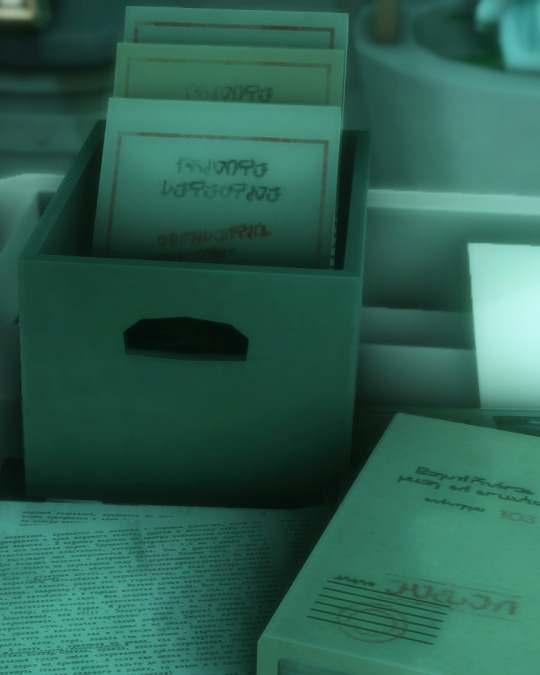
Ethan spent the next three hours in his cluttered office, surrounded by stacks of old files and a mess of digital archives on his computer. Eventually, ISAAC's voice broke the silence. "Ethan, I have located several encrypted documents closely related to your search history. Shall I bring them up?"
After a vocal confirmation, ISAAC remotely accessed Ethan's computer and began displaying a series of decrypted files with some title variation of 'Chrysalis_2023'. Project Chrysalis had been one of his most secretive assignments while working with the government where he had been tasked with engineering a containment and analysis system for biological entities. The government's vague description alluded to 'non-terrestrial biological entities', which Ethan naively interpreted as some advanced biological research.
The digital files were heavily redacted but offered enough information to remind him that he had physical evidence as well. He eventually found a folder containing detailed schematics alongside his own annotations on the nature of the project. One document in particular, an incident report, caught his eye.
Entry Date: 04/12/2023
Subject: NTBE X-23
Humanoid organism measuring 1.8 meters (6 ft.) in height. Bipedal locomotion. Epidermis is a pale yellow tone. Facial structure similar to that of a human being but with eight black eyes arranged in a symmetrical pattern. Indecipherable markings around the eyes. Subject arrived unconscious and has not regained consciousness throughout the observation period.
Subject X-23 was transferred from the recovery unit into the primary containment chamber at 1100 hours. Upon entering the containment unit, the subject's vital signs surged. Subject X-23 abruptly regained consciousness and exhibited erratic behavior. Witnesses claimed to have seen something move within the subject's skin. Vocalizations consistent with an unknown language were recorded (see audio log 0134-B1). Linguistic analysis is ongoing.
The subject shortly underwent a rapid biological transformation. Epidermal surfaces split open, extruding long, vine-like protrusions tipped with bioluminescent nodules. The cranial structure split open longitudinally, revealing a maw lined with razor-sharp teeth.
At 1400 hours, Subject X-23 initiated a violent attack on the containment unit. The material composition used proved insufficient. A containment breach occurred at 1405 hours.
Specimen X-23 lunged at Dr. ■■■■, inflicting a fatal laceration to the abdomen. Security personnel were authorized to terminate the threat. Subject X-23 was neutralized at 1410 hours. Residual specimens are being collected for further analysis. The containment unit is undergoing repairs and biohazard decontamination. Further research is on hold pending reevaluation of containment protocols.
#ts4#the sims 4#the ■■■■■■ legacy#ts4 legacy#the sims#I couldn't resist posting an extra chapter#love me some breached containment
60 notes
·
View notes
Text
MPW: Segasaki & Yoh - Language Analysis Part 1
Subtitle Corrections: EP 1 || EP 2 || EP 3
My Personal Weatherman is a story about the relationship between Segasaki and Yoh, so rather than being introduced to the characters, we the audience are dropped right into the middle of their relationship, and the only way we learn about the characters as individuals is through the way they interact with each other, and how that contrasts with how they interact with the people around them.
The show does an incredible job of keeping the portrayal of their relationship consistent across the use of character design, wardrobe, lighting, cinematography, acting choice, directorial choices and of course language use. But not everyone who watches has equal access to that last one, so I try to be as detailed as possible in my subtitle corrections posts. I'm also a bit of a language nerd. Now, I want to get into their actual relationship, because I think there is a lot of information about how they feel towards each other that's just getting missed. Also I love them and this is how I spazz.
This post is the first of four in which I hope to show how the dynamic between Segasaki and Yoh is reflected in the way they speak - specifically, in the way they address each other, and the style shifting, or speech level shifts that they both demonstrate with each other, using scenes from Ep 1 - 3. I'll be using my own translations for this, some of which differ from the Eng subs. (Please bear with the nerdiness - I don't want to assume how much people know about Japanese)

Prefacing this by saying that this language analysis is made specifically in the context of Segasaki and Yoh's relationship. There is a power imbalance here both in terms of social hierarchy (senpai/kouhai, age gap, successful/non-successful) as well as self-image (self-confident/self-conscious). Now, most of the time we see this manifested linguistically as the party with more social power using casual language forms, whilst the one with less power remains polite or formal. However, there is much more to human interaction than that, as we see in MPW where both Segasaki and Yoh shift in and out of Speech Styles often, depending on what they want to say and accomplish, as well as their emotional state.
1) Quick & Dirty Guide To Speech Styles/Formality Levels
Formality/Politeness is a spectrum and is expressed mostly through grammar and tone (sorry for the shitty word doc screencap):

1) desu/masu = formal/polite. Standard go to with the anyone you meet.
2) Generally speaking, the longer the sentence/the more syllables you hear, the more polite the sentence
3) The less direct you can be, the more polite you will sound
4) Word contractions (tsuzukereba -> tsuzukerya) = informal + impolite (but not always rude)
5) Slurred end vowels (iranai -> iranee) = informal + mostly rude, but not always (you just sound uncouth)
6) Most words have "formal", "informal" or even "rude" variations
7) CONTEXT DETERMINES EVERYTHING
Btw when I say "speaks roughly" or uses "rough speech", I mostly mean (4) + (5)
2) Speech Styles and Shifting Between Them
tl;dr
Japanese Speech Styles function like the verbal equivalent of personal space - the more formal/polite the level, the bigger the circle of personal space you maintain.
Shifts in speech styles indicate:
1) perceived changes in vertical and/or horizontal distance
2) the assumption of a position/role of the speaker in relation to the listener
3) changes in emotional state/the desire to convey emotion
4) the consideration of "polite company"
In this post we will look at examples of the first one - Vertical and Horizontal Distance.
Speech Styles: The Long Version (English Speaker POV)
Consider the way you speak if you were to say, give an important presentation in front of potential clients, versus the way you'd speak to an acquaintance you ran into on the street vs the way you'd speak to your closest friends. Different situations call for different ways of speaking - you're more likely to speak in full sentences and pronounce your words clearly for the first situation, and say "yes" instead of "yep" or "uh huh". You're also more likely to be blunt/direct with your friends than you are with clients - "You know ILU but do not under any circumstances buy that ugly ass shirt".
These context-dependent changes in speech patterns are similar to the changes in speech styles/formality levels in Japanese. Think of speech styles as the verbal equivalent of personal space. The more formal/polite the level, the bigger the circle of personal space you maintain. Dropping a level when you shouldn't is the verbal equivalent of invading someone's personal space and can make people uncomfortable and sometimes even angry. In Japan, the baseline "distance" with the average person is the way you would speak as if you were giving a presentation. Dropping to casual/informal speech might be tolerated (just like how you can tolerate someone sitting close to you and asking some questions, but it's uncomfortable), especially if you guys are around the same age, but dropping to "what's up bitcheees" when you should be at "hey how're you doing" basically tells the other person "I don't have even the basic level of respect for you".
In the same vein, the closer you are to someone, the more welcome you are in their personal space, and thus the lower the level of formality/politeness you'll keep with them. You trust that even if you speak bluntly, they'll understand you aren't trying to insult them. When and to what extent you drop a level is usually negotiated between individuals (either directly or indirectly). Once a level of casualness is established, your friends are going to look at you funny if you suddenly get all formal with them. They might even come ask if anything's wrong, or if you're angry at them or why you sound "cold". These shifts in speech levels therefore mark more than just the vertical distance between two people (ie, differences in social hierachy), they mark the horizontal distance (ie, how close people of the same "in-group" are to each other) too.
Having said that, there are times when you will shift to a more formal tone even with your friends or family - for example, when you're hosting a game at a large party and want to explain the game rules to everyone, you might enunciate your words better or keep the jokes to the minimum in order to convey the information is clearly and efficiently as possible. Similarly, if you've been appointed the leader in a group project and need people to pay attention and listen, you might change your tone of voice to command attention. In other words, when you assume a particular position, the way you speak changes too.
Finally, the way you speak to your friends/family in the presence of others (or "polite company", as they used to say) might also change - you might have no qualms cursing up a storm with your best buddy at the bar, but you might do your best to avoid being too vulgar when you're in front of their parents or your boss/university professor.
3) Segasaki and Yoh: Vertical & Horizontal Distance
Segasaki and Yoh are part of the same "in-group" in that they are in a relationship, so the horizontal distance between them is very small and before sunny days it's a negative distance - this is shown in how both Segasaki and Yoh use informal speech with each other (they generally omit the desu/masu forms aka use plain forms, and both use the informal pronoun "俺/ore" for "I" with each other).
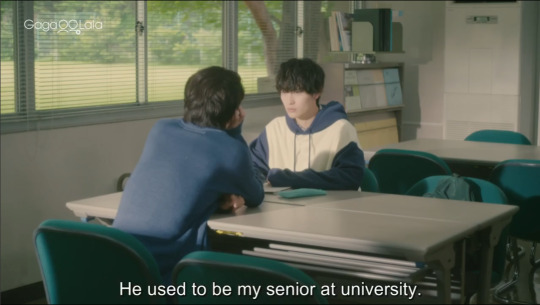
That said, there is also a hierarchy within that relationship (though their individual perceptions of that vertical distance differs) which stems not only from the nature of their living agreement, but also is likely to have carried over from their university days, when they shared a senior/junior relationship. Thus, generally speaking, Segasaki speaks quite roughly with Yoh whilst Yoh tends to use polite forms more often. Keep in mind however, that Japanese is a gendered language, and "rough speech" tends to be seen as a masculine speech pattern and can sometimes be normal between close male friends/family (otherwise, it is the verbal equivalent of getting up in someone's face and pushing them). The key here is that Yoh sticks to an informal, but more polite level than Segasaki does, and it is that difference that shows the power differential.
Horizontal Distance aka "We're Very Close"
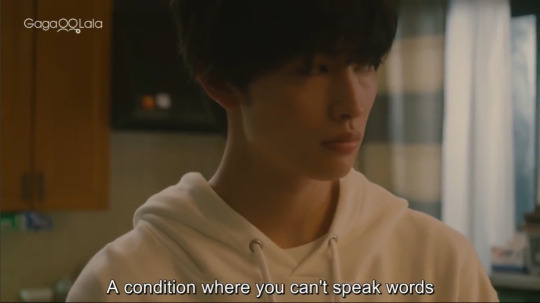
Despite Yoh's very valid complaint that Segasaki takes "man-of-few-words" to the next level (itself a liberty you'd only take with someone close to you), Segasaki only drops to rude forms in Ep 1 once:
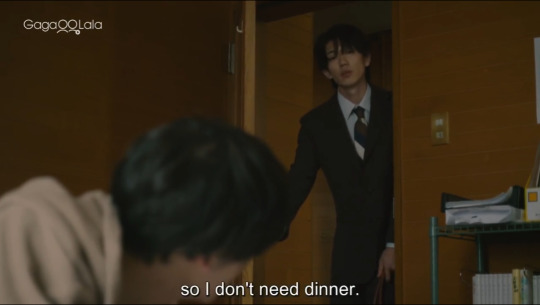
晩飯いらねぇ(banmeshi iranee) - slurred vowel
[literally - "dinner, not needed"]
Banmeshi is a more informal way of saying dinner (normal = yuu gohan).
Despite the slurred vowel, this sentence is not dismissive nor rude - it's what you'd expect between close friends/family.
In Ep 2 we hear Segasaki speak a lot more roughly to Yoh, as below, and of course during the almost-argument. But though his words are rough his intonation is often soft and he's quite tender with his touch. So, we can see that Segasaki isn't being disrespectful per se - he's not speaking roughly because he sees Yoh as beneath him in the social hierarchy - rather, he's demonstrating intimacy, familiarity and possessiveness, all at once. In fact, the more possessive he feels of Yoh, the more he drops his levels. As mentioned earlier, you only do this with people in your "in-group", with whom you know will understand you aren't insulting them.
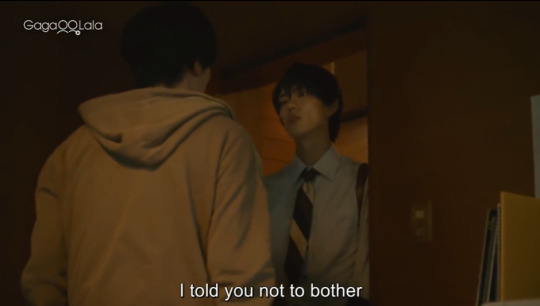
遅くなるからいらねぇっつっただろう
(osokunaru kara iranee ttsutta darou) - slurred vowel, word contraction, informal end particle
[I told you I wouldn't need it cause I'd be late right?]
Though somewhat in keeping with Segaski's curtness, this is still a pretty harsh sounding line - but note how Yoh doesn't seem offended or intimidated in the slightest - he understands that Segasaki is tired after a long day, and in return Segasaki softens his tone when he next asks "What did you make?"
Vertical Distance
It's easy to focus on Segasaki's use of rough, assertive langauge as an indicator of vertical distance, and I pointed out quite a few scenes in Ep 3 where he ends off what is essentially an order with assertive sentence-final particles. But focusing on this alone gives the mistaken impression that relationships with vertical distance go one way only - down - when in fact they are bidirectional. There is a mutual dependency between both parties, as we see clearly in MPW. Linguistically, this is portrayed through Yoh's choices to shift up a speech level.
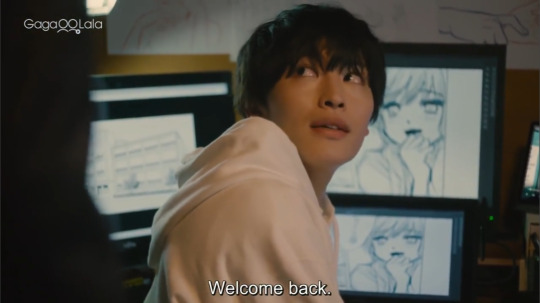
Just like how Segasaki is introduced to the audience through his proposal direct, informal and very forceful speech style, the first interaction we see Yoh have with Segasaki is a proper, standard greeting:
おかえりなさい
(okaerinasai)
[Welcome back]
Okaerinasai is the full, proper way to say this, but a more casual and common way to say this would simply be "okaeri".
See Ep 3 for discussion on standard greetings.
When Yoh thinks about Segasaki in his head, he often uses rough speech the same way Segasaki does, including the rude pronouns "aitsu/koitsu (that guy/this guy)", and yet when he speaks directly to Segasaki, he maintains an informal but still polite/neutral speech style. He rarely shifts down to rude forms, barely coming close even when drunk and emotional, but he does often switch up to a more polite level. In the above example, Yoh uses the full standard greeting in response to Segasaki's unspoken request:
俺、帰ってるんだけど
(ore, kaetterun dakedo)
[I've already come back, you know]
Ending with "dakedo" implies that speaker is going to follow up with something, usually a request or a question. In Japanese, this request/question is often left out, because the context given prior to "dakedo" is usually enough for the listener to fill in the gaps themselves. In this case, Segasaki might want a greeting or dinner, but at the very least, it's clear he wants Yoh's attention.

We know the standard greeting earlier was a style shift upwards because later in the episode, when Yoh says good night, he uses the casual version "oyasumi" instead of the full "oyasuminasai".
Even outside of standard phrases, Yoh's baseline is informal but not rude:
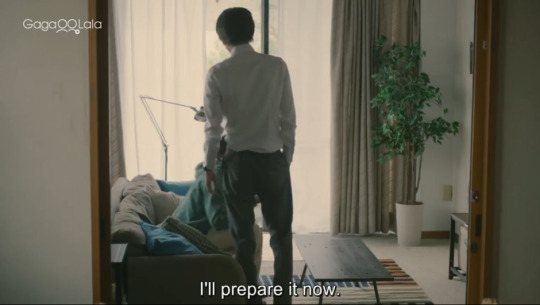
あ、いま準備する
(Ah, ima junbi suru) - plain form
[Ah, I'll prepare it now]
Probably the most telling is in Ep 3, when he's caught off guard whilst folding laundry.
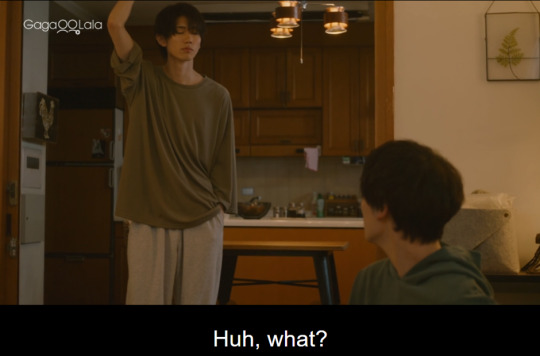
あ、なに?
(Ah, nani?) - plain form
[Oh! What?]
He answers Segasaki naturally, with just a word, as opposed to a proper “Hai/Yes?”, which he’s done sometimes when he’s unsure of himself, or if he's addressed directly.
So, we've established that Yoh’s baseline with Segasaki is informal but not rude - he feels comfortable enough with Segasaki to default to casual speech, but he acknowledges the power differential between them by simultaneously accepting Segasaki's rough speech as well as not dropping to it himself. This also tells us that the shifts up to formal/polite speech are deliberate and mean something. In EP 2, the shift demonstrated his insecurity surrounding his jealousy and their lack of physical affection, whereas in EP 3, he does it as a way to convey his gratitude.
In the next part, we'll look at how both Segasaki and Yoh use speech style shifts to convey emotion as well as to assume a particular position. Hope you enjoyed this!
#my personal weatherman#taikan yohou#体感予報#MPW language analysis#sociolinguistics#japanese language#mytranslations#MPW subtitle corrections#segasaki x yoh
157 notes
·
View notes
Text
I have a lot of thoughts about epistemology and the nature of procedural knowledge. Studying linguistics really impresses upon you just the sheer amount of human knowledge that is procedural and implicit. Languages are these huge, ridiculously complex systems, and even when it comes to the most thoroughly documented language in human history (English), you can still make an entire career documenting as-yet-unknown minutiae of some corner of a corner of the system. It's very difficult to impress upon non-linguists just how big and ill-understood languages are.
There is no book which explains the whole of English grammar. No one on earth knows the complete rule-set of English grammar. Not even for one dialect, not even for one single speaker. No one on earth could write a comprehensive treatise on English pronunciation. We do not know how English works. We do not know how any language works.
And yet, these systems are, in their entirety, already stored in the mind of every native speaker.
When it comes to synchronic information, I literally already know everything there is to know about my dialect of English. I know the timing of every articulation, the exact rules for verb and auxiliary and quantifier placement, the phonology, semantics, syntax, the lexical variation, the registers, all of it. I can deploy it effortlessly while I am thinking about something else. I can form reams of perfectly grammatical English sentences without a second thought. I can deploy the most arcane rules of wh-movement and quantifier raising and whatever else. With no effort at all.
Tens of thousands of people having been making careers trying to document these things, not for my exact dialect but for varieties essentially the same as mine, for 60 years in earnest. And they aren't close to done. And I already know it all. And so do they! They already know it too! The hard part is accessing it, putting it down on paper. That requires experimentation, systematic empirical investigation—science.
So what this has really impressed on me is how much of human knowledge is procedural. How much of it is known only in the doing. I'd wager that's the significant majority of what we know.
This is related to two thoughts that I have.
The first is about the value of unbroken lines of cultural inheritance. With language, the difference between native speakers and second language learners is stark. I think it's safe to say, per current research, that someone who learns a language in adulthood will simply never have the same command of it as someone who learned it in childhood. There are a variety of tests which consistently distinguish native from non-native speakers. You can get very good at a language as an adult learner, good enough for basically all practical needs (except being a spy), but there's a bar your brain just cannot meet.
The unfortunate fact about language is this: if the line of native-speaker-to-child transmission is ever broken, that language is lost. You can try to revive... something, if you want. Like was done with Hebrew in Israel. But it will not be the same language. And not just in the sense that, by the passing of time, all languages inherently change. In a much stronger sense than that. No matter how big a text corpus you have, no matter how well documented the language is, there is an immense body of implicit, undocumented, procedural knowledge that dies when the last native speaker does. And you cannot ever get it back.
I think, often, about the fact that so much human knowledge is procedural, is used and understood and passed on in illegible, difficult to codify ways. I think about the effect that a rapidly changing world has on this body of knowledge. Is it going to be essential for human prosperity? Probably not. But that doesn't mean that losing it will harmless. Certainly I expect much of it to be missed.
The second thought is about an epistemic distinction that I've had in my head for a long time, a distinction I'd like to refer to as that between a science and an art.
An art is any endeavor for which there is an established methodology, an established set of procedures and rules. These rules can be explicit and codified, like the rules of a game, or implicit, like the grammar of a language. They can be absolute or they can be mere guidelines. But in essence, an art is anything you can get good at. Math is quintessentially an art. Football is an art. Ballet is an art. Painting is an art. An art is any endeavor in which procedural knowledge is acquired and channeled and refined and passed on.
Art contrasts with science. A science is any endeavor in which one is shooting blind. Science is the domain of guesswork and trial-and-error. Sciences are those domains that do not lend themself to practice, because... what would you practice at? You cannot get better at science, because science is not about skill. Science is about exploration. It necessarily involves forging your own path, working with odd and faulty tools and odd and faulty ideas, trying to get them to work. Science only exists at the frontiers; when a path is well-tread enough that a body of procedure becomes known and practiced, that path is now art and no longer science.
This distinction is not a taxonomy. Everything we do involves a little bit of art and a little bit of science. Everything involves both a refinement of known skills and an exploration of new avenues. Of course there's a little bit of science in painting, there's quite a lot of science in painting. Every modern and contemporary art museum is full of it! And there's science in math, every once in a while. And there's art in biology and chemistry. Art and science are two modes of engagement, and different endeavors demand them of you in different ways.
Perhaps science is like a glider (you know, from Conway's game of life?), traveling ever outward, and with enough passes over the same area leaving art in its wake. And I think in some sense that all real human knowledge exists as art, that all endeavors capable of producing true insight are either arts or sciences buttressed by a great many supporting arts. Although maybe I'm wrong about this.
I think history is mostly science, and in large part history as a field seems to be on quite solid epistemic footing. So I don't want to convey the idea that science is inherently dubious; clearly from the above description that can't be my position. Nor is art inherently trustworthy—for instance I think jurisprudence is primarily an art, including religious jurisprudence, which of course I don't place any stock in. But I do think I'm getting at something with the idea that there are a range of epistemic benefits to working within an art that one lacks access to in a totally unconstrained science. This is also closely related to my ideas about abstraction and concretization schemes.
Language is an art, one of the oldest arts, but modern linguistics is more or less a science. Like any good science, linguistics has certain arts unique to itself—fieldwork and the comparative method come to mind—but the most vibrant parts of the field at present are science through-and-through. It's a science whose objects of study are arts, and I think maybe that's part of why I've become so aware of this distinction. Or, language is the ur-example of an art, the art from which (if I were to conjecture wildly) I think the cognitive machinery for very many other arts has been borrowed. But I don't really know.
Anyway, those are my thoughts.
219 notes
·
View notes
Text
Speaking of name pronunciations, what better time to share one of my headcanons!
Tyrian is canonically the "common language" in Tyria, and that it's derived from human languages.
For us it's just English (with all its variations), be it because that's what the actual language sounds like or because it's the translation we get while playing the game.
Now, my headcanon is that the ancestral languages of both asura and charr are closer to Romance/Indo-European languages than English, as we see strong influences of Greek and Latin in their naming schemes for people, places and things.
Charr are the most obvious, being partially based on the Romans and the fact they use a ton of Latin and Greek in both their names (Crecia coming from Lucretia, Galina coming from Galene, etc), titles (primus, centurion, etc) and their locations (castrum, templum, forum, etc).
One thing that stands out is that Flame Legion in particular seems to use the "old words" a lot more often, and that makes me believe it's something "traditional" for charr.
Asura are a bit less evident, but still they don't go more than a few sentences without using Greek/Latin-based words, usually to indicate scientific things and places, which likely means they've been using it for a long time already.
While their own names are random sounds for the most part, they often name things using the derived words or the binomial nomenclature directly (ie: the Dominus Crystallum that was a named branded lieutenant held in Rata Primus as specimen).
Now, the pronunciations in the game are all anglicized, and I headcanon it as the common language altering the pronunciation of words coming from other languages over time, and names are also often spelled weirdly because of that.
Many new generations probably never learned how to correctly pronounce things, but still I like to think that part of each population still keeps alive the old languages, be it through linguistic studies and tradition or the existence of certain dialects and accents that remained closer to the old pronunciations.
#gw2 headcanons#asura#charr#gw2 lore rambling#Skye says stuff#languages#this is a bit thrown here like this because I'm tired from irl stuff. I hope the concept is still understandable#this is a fairly strong headcanon for me as a non-native english speaker. I know how to speak “common” but words will still come out “weird#(you might have caught the mistakes that prove both of these tags lmao)
10 notes
·
View notes
Text
Linguistics post!!
I'm sure it'll come as a surprise to everyone, but just about all my fantasy short stories take place in the same universe (it was inexplicably named Triworld by my younger self, and I haven't seen fit to change it since) across different times! I've been cultivating the little universe since I was 6, and it's basically become a sprawling mess.
Nonetheless, I want to set the lore down in stone, once and for all. And where better to start than with the linguistics?
Now, in modern Triworld, there are 4 main languages. They're generally divided by species, though there is some geopolitical leakage.
Trade-tongue (occasionally known as humani, Lingua Franca of everywhere except the Cescere/Syvniko)
Spirit/Fae (more commonly known as Cescereli)
Angelic/Demonic/Sirenic (generally called Angelic)
Ghoulish (also used by the nearly extinct shifters)
Trade-tongue:
You can operate on the assumption that Trade-tongue will be considered the default. The Humans, and to a lesser extent, the elves, use it exclusively. It is a mish-mash of a variety of different languages, from the days when different tribes worshipped different gods, with a great deal of influence from the now-archaic Elvish tongue. To a non-native speaker it will have a rolling cadence, with rounded words than the a spirit or ghoul would be comfortable with.
Interestingly, it contains some Greek/Latin prefixes in it, as seen by the countries Luxatia and Nyctomachia. (As a writer, it's because younger me loved her fancy language and never saw what a pain it would be for older me. The lore reason is that a Wanderer found his/her way into Triworld and messed up human linguistics in the process)
Cescereli:
Oh dear. Where do I even begin? This is by far the most detailed of my languages, and I would go so far as to call it a conlang. It operates on a character based format, similar to Chinese, and any depictions of Cescereli in my writing will be limited to phonetic transcriptions until I work out how to input made-up symbols into my writing.
Sentence structure is fairly variable, given that it has dozens of dialects, and some linguists have (very hesitantly) suggested that the linguistic drift might be so great that they ought to be considered several languages. The spirits, being a very United people, cannot and will never accept that, and the Fae's pidgin of trade-tongue and Cescereli is remarkably faithful to what is known as the Imperial dialect.
Cescereli uses a great deal of compound words, with each character being seperated by a ' or a -, or nothing at all, depending on the type of character in use. Something that would incorporate all three might be Cescere'nari-ilra, which is what spirits use to refer to mountain elves.
Directly translated, it would mean Our (ces) Mountain (Cere) Long-eared (nari, also a term used to refer to donkeys and rabbits) Mortals (ilra, with ilre being the immortal version). As you can tell, it is my darling. I could write its own post about it, and about the spirits in general)
Now, the elves, being geographically close to the spirit Capital, share quite a bit of vocabulary with the spirits, so spirits often find themselves shocked to hear Cescereli within trade-tongue. Spirits are fiercely protective of their language and insist on speaking it amongst themselves. Any being that wishes to work amongst spirits, or to a lesser extent, Far, has to have at least some modicum of Cescereli proficiency.
To a non-native speaker, it sounds like a teakettle hissing. This has been the source of rage for many spirits.
Angelic:
A dot-based language, it has the greatest tonal variation of any tongue on Triworld. Angelic requires the speaker to transverse as far as three octaves across a single sentence, leading it to be known as song-tongue colloquially.
Few species have the vocal chords to actually pronounce the words, with sirens, angels, demons, and spirits (who refuse to speak it due to an ancient rivalry with the sirens) being the only ones truly able to speak it fluently. The remaining species, when trying to learn Angelic, use a variant known as Lesser Enochian (another remnant of a long-gone Wanderer), which has far less warbling.
It is known as the most beautiful language in existence, and sirens take great pleasure in reciting Angelic poetry to honoured guests. Demons, on the other hand, delight in their dialect, Infernal (which has its own set of sub-dialects), as a method of mocking those without sufficiently high ranges of hearing to catch their words. Angels prefer pretending they do not have to share their language with two other species, and insist their dialect is the only 'true' one.
Ghoulish:
As languages go, Ghoulish is a mess. It has a basis of shifter-speak, with a dash of Cescereli, some elven, a remarkable amount of Goddish, vampiric to taste, and what might actually be the original human tongue, or perhaps ancient ghoulish.
It came of the Lich-Queen of Ceredell (yes, you do note the Cescereli Cere being mixed with the trade-tongue Dell) wanting to cut her ties to humanity. As a tribute to the people who visited her coronation (I'm currently writing this story up now, so spoiler alert for the Lich-Queen!), she named her capital after the spirits, made shifter-tongue the national language, devoted a quarter of every mortal city to the Gods, industrialised the blood-substitute industry for the vampires, and offered free and safe immigration for all the above species.
The result was... This. Ghoulish growls and snaps and whistles and bounces of the walls like it's high on booze-berry. It technically uses the trade-tongue alphabet, but with each letter having indentations and inflections, it might as well be its own language.
Well, that's about it! I'm sorry to anyone who made it this far, that's 5 minutes of your life that you're not getting back. I could talk endlessly on my world building, but I try to obey the principle of Show, not Tell. Next up, Geography!!!
#wordbuilding#writeblr#my writing#writing#creative writing#writerscommunity#writing community#fantasy#spilled ink#writer stuff#conlang#fictional language#Me when I write articles about my writing instead of actually finishing my 50 wips#Triworld
14 notes
·
View notes
Text
Sometimes I feel like this blog is more Judaism focused than I really want it to be. Like, I am Jewish, but that’s only one aspect of my personality. I’m also interested in politics and linguistics and nerdy pop culture stuff and a whole bunch of other things. And I want this blog to have space for all of that.
So when I spent a ton of time late last week fighting with an antisemite, I told myself that when I was done with him (or as it turns out, when he was done with me), I’d take a break from posting about Jewish issues for a bit. Just like, a week where I’m just reblogging stuff that makes me laugh or an interesting language fact or something like that. Y’know, happy stuff.
He blocked me Friday, and on Saturday, Hamas attacked. And I’ve got a big mouth, so I can’t not say anything. Maybe when this is all resolved I can post happy stuff, but for right now, I need a place to talk, even though I’m struggling with what to say.
I guess the first thing I should say is that I feel terrible about what’s happening. Because what’s happened so far is bad, and what will happen next is even worse. Israel will take its vengeance; innocent Palestinians will die. The friends and families of the victims on both sides will be radicalized and the violence will continue. I hate it and it’s stupid and I wish there was an easy way to stop it and I know that there isn’t.
And I want to say that I support the Palestinian people. The way that Israel treats the Palestinians in Gaza is inhumane – it shouldn’t be allowed! But Israel treats them that way because before they did, you couldn’t get on a bus in Israel without worrying about being blown up. That shouldn’t be allowed either! Everything is complicated. Both sides are full of people who just want to live in peace who are being screwed over by a minority who won’t be happy until the other side is gone. Both sides have valid points, both sides have done terrible things. Anyone who is telling you that it isn’t complicated is either woefully uneducated about the history of the conflict, thinks one side does not deserve fundamental human rights, or both.
And after saying all that, I guess that I should make it clear that I’m still a Zionist – I believe that the Jewish people have the right to a self-determined state, and I think that Israel is probably the best place for it (I did not say a good place, I just don’t think there’s a better one. The best of a bunch of bad options is still the best). Having said that I’m a Zionist, I still hate what Israel’s government is doing and has been doing. Netanyahu is a monster. You can disagree with a country’s government and still think it has a right to exisit.
If you think that all Zionists are evil (and you’re still reading this), then tell me a better solution. Where should Jews go to be safe from governmental persecution? Or should they be denied that? If so, why?
And that’s the other thing I want to talk about. Every Jew I know is watching this with feelings of grief and horror, and the response from the left seems to be some variation on, “Israeli civilians deserved this,” “go back to where you came from,” or “terrorism is OK, actually, as long as it’s against a colonizer state (but not the one I live in).” And it’s soul-crushing. It is possible to be anti-Zionist without being antisemitic, but it seems like right now people aren’t even trying. The only good Jew is a dead Jew, and now that there are a bunch of dead Jews, everyone is celebrating.
I keep thinking about this video that I watched at school when I was a kid about the conflict. It was probably the mid 90s and the video showed Arab and Israeli kids playing together with a voice over from an interview with one of their moms. And I remember her saying that the kids playing together was good because then they would be friends, and when they got older they wouldn’t want to fight each other because they would remember that they were friends. I know now that it was probably a propaganda video, but that’s still what I want. I want leadership for Gaza that isn’t a terrorist organization, I want leadership for Israel that isn’t a far right authoritarian nightmare, I want Palestinians to not be locked behind a wall, I want Israelis who don’t have drills for when the rockets come. I want everyone – EVERYONE – to be able to live a life in peace and I want two little boys with different backgrounds and religions that both include a history in Israel to be able to play in a field by a river and be friends.
And if you don’t want that? Fuck you.
#israel#antisemitism#long post#i'm having feelings#thanks for letting me ramble#probably a lot more reblogs on this topic are incoming
39 notes
·
View notes
Text
I've been reading a book called The Unfolding of Language, that talks about language's evolution and changes over time - how decay creates things like variations to pronunciation, how meanings naturally diminish as they're used for intensifiers - lots of really interesting stuff if you're this way inclined - and how similar features appear in very different languages.
For example: the use of 'going to' as an auxiliary (so how you probably say 'gonna' in the places you would use 'will' to indicate a future event) and how it started as a verb (doing word) and how this 'misuse' has made language purists angry, how it's happened in English-- but also in French, Basque, Tamil, and Zulu, so in fact it seems to be a natural feature of human thinking, this transposition of motion in space to a motion in time.
Anyway, good book, do recommend - but I was reading a bit in one of the appendices and it struck me as kind of relevant to a bunch of people's behaviours. It's kind of long, so I'll pop it behind a read more.
The emphasis in bold is mine.
...what I really wanted to know was not so much the change from 'content' to 'grammar', but the actual transformation between syntactic categories. Surely, the switch from verb to auxiliary or from noun to preposition can't just be a matter of gradual changes in meaning. After all, it's not as if a word can be a noun and a preposition at the same time, is it? So there must have been something that actually transformed 'back' from a noun to a preposition, and there must also have been something that changed 'go' from a verb to an auxiliary. And what I would really like to know is when exactly these metamorphoses from one category to another took place, and what exactly sparked them. ... I had always assumed that a word must be one thing or the other, either a verb or an auxiliary, either a noun or a preposition. And now you are telling me that 'gonna' can be both, or perhaps neither. But if words don't always fit neatly into one syntactic category or the other, then why bother with these syntactic categories in the first place? ...
As the linguist Edward Sapir once put it, 'all grammars leak'. The main syntactic categories can be very helpful in capturing broad similarities between words. What's more, a label like 'verb' must also reflect some psychological reality: the perception in people's minds that words like 'kick', 'bite', and a great many others, behave in a very similar way and in similar appear slots. So syntactic categories can be very helpful, especially when you take a bird's-eye view of language. But when you focus on the details, you often find that words don't always fall conveniently under one of the main labels. A word can start acquiring the distribution of another category only gradually, and sometimes it can even remain stuck between categories. When one tries to describe a language, this should not pose serious problems, as long as one remembers that syntactic categories are only meant to be descriptive labels - they are supposed to serve us, not rule us. So when you ask a question such as 'when did should remember a word move from category A to category B?', that the word never had to perform any complicated acrobatics. What you are really asking is: 'when do I decide to stop using the label A for a word, and start using the label B?' So if you discover that a word like gonna' won't oblige, and won't fit neatly under either of your labels, then you should remember that what's problematic is not the word itself, but your labels. This doesn't make your labels completely useless, it just means that they are not perfect in catching every aspect of language.
#people bring this imposition of rigid rules to an organic system and then get cross when the system doesn't fit#Updated to include book title as I'm scatty AF and forgot before#The Unfolding of Language#Guy Deutscher
7 notes
·
View notes
Text

Where the Buddelaries partisans are still out to mathmaster Malachus Micgranes and the Verdons catapelting the camibalistics out of Whoyteboyce of Hoodie Head. Assiegates and boomeringstroms.
Finnegan’s Wake - James Joyce
ChatGPT4o critical interpretations (Created ChatGPT):
This passage—"Where the Buddelaries partisans are still out to mathmaster Malachus Micgranes and the Verdons catapelting the camibalistics out of Whoyteboyce of Hoodie Head. Assiegates and boomeringstroms."—from Finnegans Wake exemplifies Joyce's characteristic dense layering of historical references, wordplay, and symbolic conflict. It's a riot of historical, mythological, and linguistic motifs, reflecting Joyce’s view of history as cyclical and full of repetition.
1. Historical and Political Conflict: Buddelaries vs. Verdons
At its core, this passage presents a scene of conflict, with two opposing factions—the Buddelaries partisans and the Verdons—engaged in a kind of battle. As is typical in Finnegans Wake, these groups are likely stand-ins for larger historical forces, reflecting Joyce’s cyclical vision of history, where conflicts recur across time.
The Buddelaries are likely a playful corruption of Butler—one of the most famous families in Irish history, the Butlers of Ormonde, who were rivals of the Fitzgeralds (associated with the color green, or the Verdons). The Butlers and Fitzgeralds were two powerful Anglo-Irish families who frequently clashed during the medieval period.
The Verdons, in contrast, may represent the Fitzgeralds or some broader faction aligned with the "green" of Irish nationalism (verdon, derived from verde, meaning "green"). This suggests a confrontation between forces of colonial power (the Butlers) and Irish nationalism (the Fitzgeralds, or the "green" cause), echoing Ireland's centuries-long struggle for independence from English rule.
Thus, the Buddelaries and Verdons could symbolize rival factions in Ireland's long history of civil strife, clan warfare, or even its later nationalist movements. The battle being described is likely symbolic of the historical cycles of conflict that have plagued Ireland, where similar struggles play out again and again under different names and guises.
2. Mathematical and Intellectual Conflict: "Mathmaster Malachus Micgranes"
The reference to "mathmaster Malachus Micgranes" adds an intellectual or perhaps mythological dimension to the scene. The name "Malachus Micgranes" could be a variation of Malachi, referencing both St. Malachy, the 12th-century Irish saint and prophet, and Malachy of Armagh, a figure associated with ecclesiastical reform. The "mathmaster" suggests that this character is someone who seeks to impose order, logic, or structure—possibly through calculation, strategy, or intellectual prowess.
"Micgranes": This could evoke McGrane, another Irish surname, but more importantly, it sounds like Migraines, suggesting that this mathmaster is burdened by intellectual strain or headache-inducing tasks. Joyce often blended mythic or heroic figures with human frailty or absurdity, so this figure may represent both the ambition to master or measure the chaotic forces of history and the futility of doing so.
The inclusion of a "mathmaster" could also symbolize the attempt to impose logic on the illogical, much as Joyce is doing throughout Finnegans Wake with his dense and often chaotic language. "Mathmaster Malachus" might be seen as an ironic figure—an attempt to master history or language that is inevitably doomed to fail in the face of Joyce’s unruly, nonlinear narrative.
3. Violent Imagery and Weaponry: "Catapelting the camibalistics"
The "Verdons catapelting the camibalistics" introduces a violent, war-like scene. "Catapelting" is a playful merging of "catapult" and "pelting," suggesting that the Verdons are hurling something at their enemies with a catapult. The target, in this case, is "camibalistics," which seems to be a blend of cannibals and ballistics, indicating a highly destructive or primal form of warfare.
This phrase might reference both the primitive violence of warfare and a kind of intellectual or cultural "cannibalism"—where one group devours the other, either literally or metaphorically, by imposing its values or beliefs. Joyce's use of violent imagery here underscores the relentless brutality of historical cycles, where warring factions consume one another endlessly.
"Cannibalistics" could be read as a comment on how history often repeats itself in a cannibalistic way, with newer regimes or ideologies consuming and repurposing the old ones, only to be consumed in turn. This idea of cyclical destruction is a central theme in Finnegans Wake.
4. Whoyteboyce and Hoodie Head: Colonialism and Power Dynamics
"Whoyteboyce of Hoodie Head" offers a pun-rich target for interpretation. "Whoyteboyce" is an obvious distortion of Whiteboys, a rural insurgent group active in 18th-century Ireland that resisted landlords and oppressive taxation. They were primarily Irish Catholics who adopted this name because they wore white smocks during their nighttime raids.
"Whoyteboyce" also suggests Whiteness as a symbol of colonial or establishment power (as in English rule over Ireland), while "Hoodie Head" could evoke an image of a cloaked or hooded figure, possibly implying disguise, resistance, or even death (the hood as a death shroud, or a criminal's hood).
Together, "Whoyteboyce of Hoodie Head" might symbolize the conflict between colonial authority and insurgent forces. The Whiteboys, though rebels against English landlords, were often associated with both resistance and chaos, and Joyce could be blurring these roles, complicating the idea of heroism versus villainy in Ireland’s history of rebellion.
5. Sieges and Repetition: "Assiegates and boomeringstroms"
The concluding line—"Assiegates and boomeringstroms"—reinforces the theme of conflict, siege, and cyclical violence:
"Assiegates" is likely derived from the French assiéger, meaning to lay siege. This suggests that the ongoing conflict is not just a battle but a siege, implying a long, drawn-out confrontation rather than a quick skirmish. The idea of siege connects back to the cycles of oppression and rebellion that characterize much of Ireland's history.
"Boomeringstroms" is a mashup of "boomerang" and "storm," implying repetitive, cyclical violence that returns again and again—like a storm that circles back or a boomerang that always comes around. This could represent how conflict, once initiated, tends to perpetuate itself endlessly, much like the cyclical nature of history and narrative in Finnegans Wake.
The boomerang is also a symbol of unintended consequences or the return of past actions to haunt the present, suggesting that the violent and oppressive actions of one group will eventually return to affect them.
Conclusion
This passage weaves together Joyce’s preoccupations with Irish history, cycles of violence, mythology, and wordplay, presenting a scene of eternal conflict between opposing forces. The Buddelaries and Verdons are likely symbolic of historical factions in Irish history, particularly the Butlers and Fitzgeralds, or more broadly, the conflict between colonial power and Irish nationalism.
The references to siege warfare, boomerangs, and cannibalistic violence suggest that these battles are part of a never-ending cycle, reflecting the recurring nature of history, where each conflict seems to feed into the next. Through dense language and layered allusions, Joyce presents a vision of human history as an eternal struggle, where factions rise and fall, only to be replaced by new ones, each feeding off the chaos of the past.
2 notes
·
View notes
Text
so this post by @icebluecyanide greatly brings to attention how the majority of languages in the world don't have gender marking for pronouns, though the list in it is pretty limited. it's understandable not to know these things depending on what languages you speak or are exposed to, and the reblogs (while they do have the spirit) are a bit confused. science education however is my passion so here are some visualizers and clarifications on gender in languages!
first, a look at gender marking in pronouns.
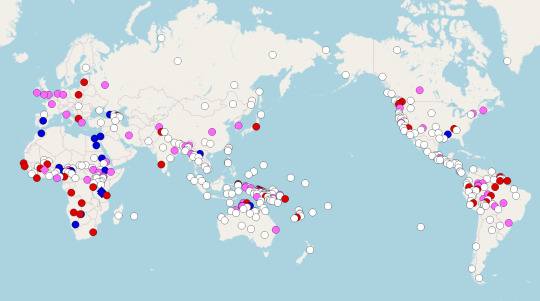
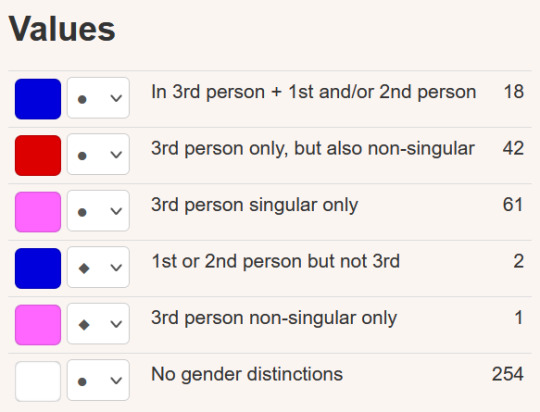
as pointed out in the post, it is uncommon to have gender marking in pronouns - only about 30% of languages do it, while the vast majority of languages omits the distinction. you'd be forgiven for finding this surprising! gender opposition in pronouns is common in european languages, with africa being another prominent area for gender marking. gender distinction in pronouns is usually sex-based (masculine and feminine and sometimes neuter(s)).
next, to address the confusion in the reblogs! the last reblog spoke of number marking in pronouns, or "the amount of subjects". they mention differentiation between two or more subjects (dual-plural) and whether the speaker or listener (or both) are included (inclusivity-exclusivity). grammatical number and clusivity vary in languages, and even more distinctions exist than mentioned! but as they are separate from gender, i won't get into them here.
one reblog by @assuming-dinosaur states that english is "highly unusual among languages in having grammatical gender align so precisely with the social concept of gender". they also mention multiple interrelated phenomena related to noun class/gender systems. clarifications:
languages vary in how grammatical gender/class is assigned to nouns - some languages assign gender solely based on the meaning of the word (e.g. "woman" is feminine), or additionally based on form or pronunciation (e.g. all words ending in "-a" are feminine).
"gender" in linguistics means a system for categorizing nouns, alternatively called "noun class". while these systems can have significant overlap with the social and cultural concepts of gender/sex, as mentioned in the reblog, there are lots of systems whose criteria for noun categorization are unrelated to "natural gender". in addition to sex and pronunciation as factors in assigning grammatical gender, grambank features factors such as shape, animacy and plant-status.
modern english does not, for the most part, have grammatical gender, so it's a bit silly to compare its pronouns to languages with wider-reaching gender systems. as stated above, the masculine/feminine/neuter distinction in pronouns is very common worldwide. and even in english, the alignment isn't 100% precise - e.g. ships and churches may also be referred to as "she".
many languages have a gender system that utilizes multiple factors for noun class assignment. of languages with gender systems in wals's sample, a majority include some sex-based distinction. all non-sex-based systems in the sample were based on some kind of animacy, most often human vs. non-human, or animate vs. inanimate. there's plenty of variation in what is considered animate, though! (in sumerian, for example, humans, gods, and statues (sometimes) were animate, while slaves, among others, were classified as inanimate.)
and yet, after such a long ramble on gender systems, let us remember that languages with gender/noun class systems are in the minority.
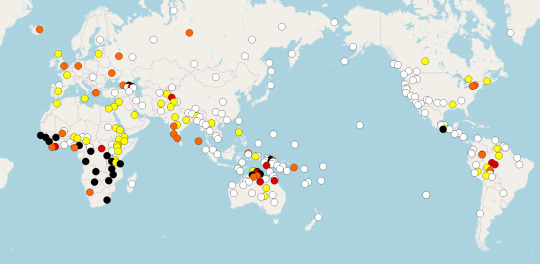

ending on this lovely map demonstrating on one hand how common it is to not have grammatical gender, and on the other, the variety of existing gender systems!
all maps and articles linked here are from wals, the world atlas of language structures, as well as grambank, two wonderful typological databases. wals's language sample size is quite small, but the maps and articles are still very useful and informative for typological comparison. for a larger sample size visit grambank! here's their article on gender in third person pronouns and sex-based noun class systems.
#linguistics#linguistics tag#language#bro i was supposed to go out but instead i spent way too long writing this#some wikipedia links. they do have information that should suffice as a primer if you don't wanna get Into It#text#also to people @d here this isn't a callout lmao just clearing up some things and providing more info
4 notes
·
View notes
Text
Naming conventions of the shoreside merfolk (why Dart doesn't have a last name)
*Everything in this post is entirely made up by me.
uhhh I used the term "shoreside" for something merfolk related in NPAM before, but I can't find it now. So I'm going to use it here as meaning: the merfolk that live around the reef and the shallower water of the NPAM island.
All merfolk language is very melody-central. They have a whole calendar of songs, and sing a lot of them in community with each other, or hum a particular pattern according to its particular day. Regular commonplace communication is also spoken in a more musical rhythm than human speech.
That being said, there are still different languages, different ways to say the same thing, and different regional dialects and cultures. Each linguistically distinct group of merfolk have melodic and rhythmic habits. Plus, mer names are very long, often having the meaning of an entire phrase.
The names are more distinct, and then a layer of regional dialect makes them more distinct. So Dart's full name would have a certain shoreside cadence to it. If someone else had the same name, it'd have a slight difference according to dialect. So merfolk can essentially hear the difference between "Dart from the shallows" and "Dart from the lagoon over yonder."
Merfolk families, who probably do the most singing together on a daily basis, are naturally going to develop their own little insider quirks, even more than humans do. It's a linguistic marker for family groups, which last names unnecessary. I guess it'd be sort of like a tonal language in some ways? But even more so. There's a whole meta layer of phonetics added to the base words of what they are actually saying.
Of course, other merfolk do use last names, and perhaps were not raised to hear such subtleties. Then, they may add descriptors like "Dart with the green tail" vs "Little baby Dart."
Because all merfolk are united by the Songs, this allows for a lot of language variation, while still maintaining a baseline amount of understanding across groups.
6 notes
·
View notes
Text
i appreciate legible misspelling more than a commitment to standardised (what would now be known as correct) spelling. one, you’re saying what you mean while being unburdened by self judgement and perception, two, i like destandardising spelling as a concept it gives reading a little zhuzh and i like seeing the phonetic variation between dialects written, and three, who can even remember all that stuff anyways. spell scenery as senery. spell carriage as cairrage (examples i’ve seen recently) evolution of language is what makes them not dead. human lifespans aren’t long enough to witness long term linguistic shifts unfortunately but they are long enough to witness this.
5 notes
·
View notes
Note
Two questions for you, if you don't mind!
I'm working on a story that's set in a future version of the real world. Can you give me any advice on how modern languages might change going forward? Are there any sort of "trends" in phonology that might continue?
Also, the world consists of several post-human races that have differentiated to fill ecological niches. Some look and act more like buffalo, others like arthropods, et cetera. I want them to all speak different [accents?|dialects?] of the same language, but I'm having trouble keeping consistent the sounds that each race can or can't make. It's also difficult to make them feel unique without restricting their vocabulary down to only a few phonemes. Do you have any advice on developing phonetic restrictions?
Hi literal-bot! Thanks for your questions!
Predicting language change is extremely difficult. Language change occurs in all aspects of a language, including sound/phonetics, semantics, inflection, and vocabulary. We can describe what a language looked like at a previous point in time and compare it to itself at another point in time, or compare related languages to each other at the same point in time. (Assuming that we have written material for all of them. The oldest texts that are more than inscriptions on tools or stones that we have for the Germanic languages date to the 9th century CE. Except the Gothic Bible, which dates to the 4th century, but Gothic is the only attested East Germanic language, and that entire branch is extinct. Then there’s 500 years of, like, “I built this stone in honor of my son who died at sea” or nothing at all.) Since you asked about sound change, that’s what I’ll focus on here. Also, I can only speak with any expertise about the Germanic languages (mainly German, but you can’t avoid learning about English if you study linguistics in the US), so specific examples will vary if you’re talking about, say, French or Māori or Mandarin. I have plans to cover this extensively in my book, and a full discussion would be way too long for a tumblr post, so this is going to be more superficial than I would like.
Sound change can occur with consonants. That’s why English has day, Norwegian, Danish, and Swedish have dag, and German has Tag. It’s also why the Germanic languages have fish and brother, but Latin and its descendents have piscis and frater. (And then there’s Swiss German.)
Vowels can also change, of course. There were vowel changes that occurred before the Germanic peoples had writing that gave Germanic languages the historical [o] sound in brother (that has since shifted further in the West Germanic languages) instead of the [a] sound in Latin frater. The Great Vowel Shift is why English spelling makes no god damn sense.
There are several sound changes occurring in US English right now, as well as a wide variety of regional variations. (UK, Australian, and New Zealand Englishes also have their own sets of vowel changes and regional variations that I am not expert in and cannot discuss.) You could take any of these and make them the dominant variation in your future society.
The most notable sound change is referred to as the Northern Cities Vowel Shift, and it could be the next big thing. The first step was documented in the 1960s (but probably started in the 1930s), a tensing and raising of the [æ] vowel in trap to something more like trep, and there are now 6 documented shifts.
Another major ongoing vowel change is the cot/caught merger. (If you pronounce these two words the same, congratulations – you have the merger, like most North Americans! I do not.) Regional variations in vowel sound include monophthongization in the South (I –> ah) and the pin/pen merger.
I’ve been noticing a couple things when I watch movies or peer-reviewed tiktoks or when I talk to people, and I don’t know if they’ve been studied yet. The first is a tensing of the /i/ vowel in words like king or going to sound more like an /e/, like keeng or goeeng. I don’t have any data on who’s doing it, so I can’t speculate on what region it comes from or how old the people who do it are. If nobody over 20 is doing it, it’s a more recent change than if the cutoff is 40. But I heard it from grad school friends who were in their mid-20s at the time (five years ago), so it’s not SUPER recent.
The other thing is super cool to me, because it parallels the first Germanic sound shift. The [k] sound in words like cool or clear is becoming more heavily aspirated and maybe even becoming a fricative. Which is exactly what happened like 2000 years ago! First, what is aspiration? Aspiration is the presence of a puff of air when you release a stop, like /p t k/. Put your hand in front of your mouth and say top. You’ll feel a little puff after the /t/ and /p/. Second, what’s a fricative? That’s sounds like /s f h/, where the air moves through a constriction. So, the [k] is already aspirated because of how English works, but maybe it’s a little hard to distinguish sometimes, so you add a little extra /h/ to it, and eventually you get enough in there that it’s almost [x] – the sound in German ach.
So, phonologically speaking, ¯\_(ツ)_/¯ Start with the pages I linked and pick something you like, then take it further. What happened in the past is likely to happen again. But on the plus side, whatever you decide, nobody can tell you you’re wrong. If you have institutional access (I do not), this reference encyclopedia looks amazing. If your outgoing language isn’t English, try searching for some variation of “ongoing sound change in X” until you find something.
Your second question overlaps slightly with one in my inbox (whose answer should go up on Friday), so I’ll have a more detailed answer then. But for now, here’s a VERY superficial preview (and I have about 5000 words on this in my current book draft, so this is the idk 200-word version of something that’s already a highly condensed version of half a semester of grad school, so, uh, I hope this makes sense.)
As you’ve already pointed out, mouth shape affects what sounds a creature can make. But real-world linguistics only studies human speech, for obvious reasons, so what do you do when a bison gains language? One thing you can do is sketch out their vocal tract and figure out which human sounds just aren’t accessible to them. How muscular are their lips/jowls? Will they be able to round or purse them to make /oo/ sounds? Will labiodentals ([f v]) be possible?
I like the way this graphic shows the human vocal tract over the IPA chart, because it puts the two things right next to each other. It doesn’t explain what the articulations are, but this (very dry) page does. So you have your human vocal tract and your sketch of your non-human vocal tract (to the same scale), and if you overlay them, you’ll find places that can make interesting differences in what speech sounds are or aren’t available between one species and the other.
If you think this is interesting, consider backing my Kickstarter, where I’ll be writing a book about how to use linguistics in your worldbuilding process. Or if tumblr ever sorts out tipping for my account, leave me a tip.
5 notes
·
View notes
Text
[ cup & kiss ] – for the sender’s muse to cup the receiver muses’ face during an incredibly passionate and long overdue kiss. - autometallums for you know exactly who 💜💜💜
answering: @proserphinas
long overdue
when his skin was metal, there came a time that alphonse felt quite mathematical about the passing of a day. the day started at 00:00; it ended at 00:00. the day consisted of twenty-four hours, & he was awake for every second. by necessity, alphonse clung to the memory that he was human — he was a living soul. consequently, he couldn’t waste or will the time away by wishing that the day would pass a little faster. that kind of wish wasn’t worth it when life was considered.
even so, the time passed fast enough. for years, edward installed in alphonse a feeling of such immediacy that alphonse wins his humanbody again without wishing too hard that time would just happen.
he wears a humanbody again. it feels natural & right &
alphonse feels a bit like a mummy. or a skeleton. or something.
again, it will take years for alphonse to grow into his body. his soul & his body are intertwined, of course, but they speak different languages. it feels as though there are lagging moments of dissociation that shake alphonse out of the present & into the future —- then, there are lagging moments where his body / his senses decide everything is new again & everything strikes him with meteor speed.
it’s amazing & welcome & overwhelming & welcome.
still — lagging moments mean lagging awareness. it’s true that alphonse feels both validated & vindicated to be a person again — it feels a little as though he can laugh at truth & say ‘ ha ! my memories were true ! ‘ but at the same time
he needs to shed metal.
so he travels. he goes to xing. when he’s crossing the desert, he’s curious. alphonse toes off his shoes & his socks; he presses his feet into the sand & startles when he realizes that it’s hot.
he startles more & laughs when he realizes at night that he’s cold.
alphonse travels to claim curiosity for himself, to challenge himself to wrestle down the prospect of too much new sensory information. he travels because he can, & because ( for better or worse ) it’s difficult to imagine himself as stationary.
when alphonse travels, he starts to learn three languages — some of them branches of a larger linguistic family. he writes letters & learns that he’s
desert hot. desert cold.
it’s wonderful to travel, & ( on principle ) things feel too uncertain for him to leave home for long.
. . . alphonse makes the trip back & forth several times.
each time, he appears a few centimeters taller. his shoulders appear a little broader, & he’s deciding that sunshine feels much grander / much more devilish than he’s ever remembered.
mar bears with him as alphonse remembers to be a person & grows into himself. he expands into : the borders of his fingertips, the undeserved / sudden ache at his shoulder, his meticulously trimmed hair ( he hates for it to grow too long. he doesn’t like the reminder of the neglect his body had faced ).
mar bears with him & thrives in the meantime.
alphonse is twenty-six now, & he’s growing into impulse as though it’s a natural comfort.
mar bears with him & grows success whenever he chances to talk to her, when he makes the journey back home & tells her that the air smells different than it does two towns over, two cities over, two distances away. it’s exciting, & he feels a little out of place — but it’s comfortable.
she chastises him for a sunburn that lashes the back of his hands scarlet, & he sheepishly rubs the back of his neck &
there are fireworks — or some variation of fireworks. celebratory pops in the sky & shouts & the smell of metal & juniper. alphonse can’t quite place why he smells juniper, but it’s there & it makes him feel fresh &
impulse feels right.
mar is still scrutinizing the burn on his hand, & he tilts his head just a little to the right to surge forward & taste a sweet touch. when he kisses her, alphonse kisses warmth.
alphonse is twenty-six now. mar’s hand is at his jaw, &
the night isn’t desert cold. alphonse is going to keep traveling, but there’s something nice about the smell of metal & juniper. he’s building a memory, & he prays that she is too.
. . . he believes that she’s building a memory too.
their knees knock, & they separate.
mar bears with him, &
she is warm, she is warmth.
#/iconless#i did sdfbgsdf two edits of this pls pray it's enough sdfg and#damn it's been a while since i posted but foR YOU#I TRIED#proserphinas#dsfigjdfg anyway i love you#107. alphonse#1. question
3 notes
·
View notes
Text

I posted 3,595 times in 2022
That's 2,566 more posts than 2021!
371 posts created (10%)
3,224 posts reblogged (90%)
Blogs I reblogged the most:
@channeling-inner-potato
@hi-raethia
@spixi
I tagged 3,037 of my posts in 2022
Only 16% of my posts had no tags
#jujutsu kaisen - 613 posts
#caps - 340 posts
#fullmetal alchemist brotherhood - 299 posts
#haikyuu!! - 200 posts
#ocean asks - 160 posts
#my hero academia - 148 posts
#mob psycho 100 - 147 posts
#ocean.mp3 - 130 posts
#project sekai - 118 posts
#satosugu - 114 posts
Longest Tag: 139 characters
#hhdkjhdkgdvfhdgsjkdjgvdhkdjhjhddjkdhdjdhjdkhhddkhjkdhljghdjgdjkhhgfgkhdhkjdhdkgdvgdkjdhbdhkjhbeyhhjkbdkjdhbkhebouhebhjkhbdhjbdhsjkhshgeuoyg
My Top Posts in 2022:
#5
the amount of detail and effort that went into it. i just KNOW i have to rewatch it to really get it bc there was so much THERE it was so jam packed of stuff i LOVED it
36 notes - Posted March 16, 2022
#4
Something I wish was like. Actually Covered in Dr. Stone that I think would have been super cool is like. linguistic differences.
Because like, okay. you have a mini society that's been living in complete isolation for over 3000 years, totally apart from everything else, and then you have characters like senkuu, gen, tsukasa, ukyo, hyoga etc. who are very much from 'our time', kept in stone for those 3000 years, retaining all memories and language from that era.
like. 3000 years is a SUPER long time. Even with the 100 Tales that got passed through the generations to Ruri, which I imagine would help in keeping the language the same for all that time, I'm surprised there's like. zero differences. that they're able to communicate seamlessly. that there is no variation, no slang, no new words, no thick accents, no nothing.
Like, as a real life example, Old English was used about 2000 years ago. And I bet most of you would have a Pretty Hard Time understanding it, and that's only from like 2/3 the amount of time that separates the Ishigami villagers and the other characters. it almost seems like another language.
I would have LOVED the first interaction between Kohaku and Senkuu to have been WILDLY confusing and surprising. Kohaku sees this random dude and attacks, and then he starts speaking this absolute gobbledygook that only sounds very very vaguely familiar and also sounds weirdly Proper. and then kohaku responds in confusion, and to senkuu she's speaking this weird weird language that is only barely recognisable and sounds super casual and fast. and they Can't Talk to each other, which makes the entire ordeal with getting the villagers to trust senkuu That Much Harder lmao. but finally, FINALLY when Senkuu is able to meet Ruri and she hears the way he talks is like hey wait a minute I Know This. and she tells him the 100 tales (still in the original language) that everyone else thought sounded like a series of weird incantations but senkuu is like Oh. Oh Okay also dad why did you put so many memes in this. (like in canon lmao) and just. the langauge barriers!!!!! I WISH THERE WAS A LANGUAGE BARRIER IN DR. STONE OKAY.
EDIT: some cool people showed me a really good fic and a more in-depth post on this concept!! I highly reccomend checking them out!
57 notes - Posted March 8, 2022
#3

what if i broke down. what if this was it huh.
86 notes - Posted May 7, 2022
#2
it's. it's about human connection and the loss of it, it's about not fitting in and rejoicing in that uniqueness, it's about longing for something, having it, and mourning the loss of it, it's about searching for that person everywhere, once they're gone you see them in everything its about the confusion and ambiguity and panic that comes with a realistic dream, it's about dreaming and the strangeness of dreaming, it's about being a little in love with your best friend, it's about the fragility of our bonds, it's about missing people, it's about love.
125 notes - Posted March 16, 2022
My #1 post of 2022
i get so emotional over non-human characters who are experiencing 'being human' and fundamentally are lonely and just want friends that all they'd ever want is friendship and company and that is the most important part of being human for them is to have friends..... god. GOD,, give me a moment here im. IM.
538 notes - Posted May 7, 2022
Get your Tumblr 2022 Year in Review →
#tumblr2022#year in review#my 2022 tumblr year in review#your tumblr year in review#aaaah my adam by eve post and my favourite hgsn post being my top 2 <333
2 notes
·
View notes